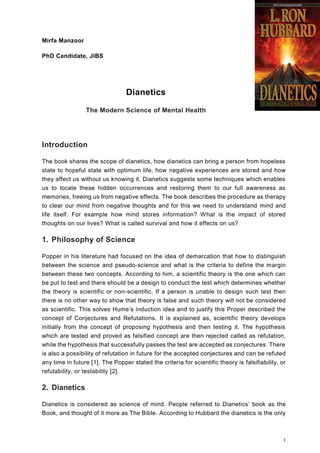The Main Principles Of Dianetics
The Main Principles Of Dianetics
Blog Article
The smart Trick of Dianetics That Nobody is Talking About
Table of ContentsThe Buzz on DianeticsGet This Report on DianeticsThe Facts About Dianetics RevealedThe Best Guide To Dianetics
I couldn't ever not wish to receive anything that comes to mind for you- if it was otherwise, I wouldn't be sitting here with you, doing this. I not just might never ever have a trouble, or not wish to hear something that comes to mind for you, but I'm totally excited to know every concept, every idea, every picture or feeling that arises or shows up for you- don't ever assume or else, and if for some reason you do, please just allow me understand! Often, you may have an idea, and photo, idea or incident turn up that does not seem to answer the inquiry, or associate to it, but however, constantly do tell me concerning it, and as we proceed, the relevance will certainly arise for you.This is integral in the basis of processing, and the subject of this conversation: the fundamental functions of the counselor and the customer: The basic duty of the counselor is, in contrast to "typical training", not to manage, which means to enforce and/or hinder, but to rather work from the basis of EMPOWERING THE CUSTOMER.

The Greatest Guide To Dianetics
John Mcmasters expressed this standard truth splendidly well in one of his talks on Power processing, wherein he clarifies exactly how he was asked what this "unique knack" was that he had for offering such excellent sessions; he had to believe about that for a minute, and detected that it was what he wasn't doing, along with what he was doing: he had not been evaluating, judging, computer, or as a matter of fact, creating any thoughts, not to mention verbal expressions, after offering the command and while waiting for the PC to finish their response to their fulfillment; he was, just and only, existing with the computer, and completely interested.
The role of the therapist, demonstrated; that was his "special propensity". I have actually had my very own experience which educated me this well, really early on in the game. In 1982, having recently completed my training and internship on New Era Dianetics, I was running this on a PC, and there was a point in the session where (being a bit damp behind the ears not yet having many hours under my belt as a professional auditor) the PC seemed to be "taking too long" to express anything vocally after I offered him a command.
This key transformed out to be one of the most valuable contribution that John ever before made to the topic of treatment or bookkeeping (Dianetics). In my modest point of view, it is the best payment that anyone has ever made to these subjectsthe application is completely non-judgemental, non-evaluative, and lacking any type of recommendation, recommendations or opinion.no preconditioned agenda for individuals, or 'levels' that they must do
In Scientology we prided ourselves on not examining for people. All that really suggested was that the auditor did not Vocally assess for the PC in session.
About Dianetics

Any individual who a fantastic read had actually ever seen John audit could not aid however notice an unique top quality in his bookkeeping."The client's standard role is to be there with the purpose of relocating the direction of their spiritual objectives, and to openly and completely reveal and experience whatever shows up for them in responding to the questions and carrying out the instructions in the handling.
This is something to procedure as needed. Also, people often have previous experience and/or brainwashing in auditing/processing which, in some ways, and to some degrees, really misdirects them official source into attitudes, concepts and habits patterns that protect against the full realization of these functions, and so they will certainly often tend to hinder the expressing of what comes to mind, as in the instances provided above - Dianetics. * The very first, and maybe leading examples of mis-indoctrination causing much less than entirely smooth and reliable sessions, can be discovered in specific elements of the training routines, or "TR's":"TR's" are commonly an individual's initial, or at the very least early, experience in Scientology, and while I will go on to explain what I see as the defects in idea and method, nonetheless, have a tendency to be substantially healing, done as they are given (Hubbard insists that "TR's are not processing, they are educating", yet factually, they are both handling AND training)
Alan Walter made similar observations, and improved these with his "Existence Processes". There is no "flunking", and no denial of the fact of this being processing. The focus, as it must be, gets on experiencing the other person's existence. All the manifestations which obtain a "flunk" in doing "TR-0" are merely the being's efforts to stand up to the other individual's existence, and instead of being pestered and pestered with "Flunk", which imposes "failing!" on the being, one simply needs to be urged to "stick their feet in the water a little much deeper", to significantly restore their ability and willingness to totally share and experience "being below", or "existence", with others.
The Of Dianetics

Report this page